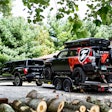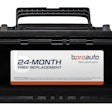 Samsara VG33
Samsara VG33Ten minutes of wasted driving doesn’t seem like much, but if it happens each day throughout the work week, that’s nearly an hour of lost time.
Multiply that by 30 vehicles and that’s 25 hours gone. Time easily slips away and with it a profit margin.
Knowledge is power in any fleet and that’s where Samsara has stepped in to bridge the gap with its VG33 cellular GPS tracker.
“Roughly seven in ten commercial vehicles in the United States does not have any form of telematics today,” says Samsara co-founder and CEO Sanjit Biswas. “But businesses are managing more and more of their operations over the Internet and from their smartphones. As operations are becoming more data-driven, fleet managers are taking a second look at GPS and telematics, and are discovering a solution that is more modern and business-relevant than what they’d seen before.”
The VG33 is built on a history of proven wireless networking. Biswass and Samsara co-founder and CTO John Bickett both founded and led networking company Meraki following their research at MIT. Meraki was sold to Cisco Systems in 2012 for $1.2 billion.
Kiren Sekar, Samsara’s vice president of marketing and product management, told Hard Working Trucks that wireless networking experience gained through the years at Meraki through clients at banks, hospitals and the U.S. Department of Defense, has been poured into Samsara and the VG33.
“We’ve been developing these systems for very serious security conscious customers for over a decade, and so right off the bat we started building Samsara with security in mind. Everything is encrypted end to end,” Sekar explained.
To further help with security, Samsara offers third party audits and regularly conducts over-the-air updates.
The VG33 connects to a vehicle’s diagnostic port and keeps up with engine data like fuel consumption, battery voltage and fault codes. (Sekar talks more about the device in a video below.)
The unit, which is about the size of a deck of cards, connects wirelessly to various sensors which may be used for such things like monitoring the temperature and humidity of refrigerated cargo and specialized equipment like snow plows and lift arms. Plug-and-play sensors are about the size of a matchbook. No wires or rechargeable batteries are required.
Another time-saving sensor offered with the VG33 is the driver ID token. Instead of having to manually enter information, the device will detect a unique token that can be kept in a driver’s pocket.
Cellular connectivity allows the VG33 to provide a WiFi hotspot through dependable carriers in the region. Drivers with laptops, tablets and smartphones can access productivity apps and hours of service logs through Samsara’s 500MB data plan, which is provided at no extra cost.
Software features and apps leverage wireless capabilities, enabling operators to identify issues, spot trends, and streamline the routing, dispatching and maintenance of their fleet.
A driver app for iOS and Android devices provides ELD-ready hours of service logging, for fleets subject to the upcoming Department of Transportation ELD mandate, vehicle inspection reporting (DVIR) and a dispatch system enabling dispatchers to send new stops and routes to drivers, and for drivers to manage their routes with turn-by-turn directions.
“One of the most powerful reports in the system is Samsara’s route analytics,” Kiren said. “Route analytics compares your planned routes with your actual performance, so you can see which routes actually have the most late, or missed stops.”
As was done with Meraki networking products, Samsara will offer fleets of any size a free trial of its VG33, which takes about 15 minutes to install.
“That’s also something we did in our previous business that was kind of unheard of in the IT networking industry, to give units out like that, but it ended up becoming a huge factor in the company’s growth and we’re doing that again here,” Kiren said.
Samsara clients typically start with a one-year contract.
“But that’s our starting point. We try to keep it very flexible for our customers,” Kiren explained.










